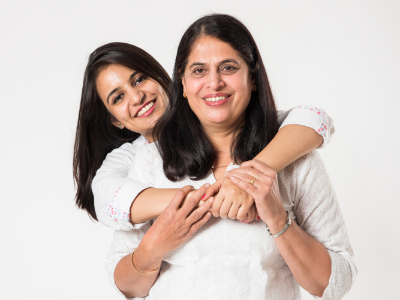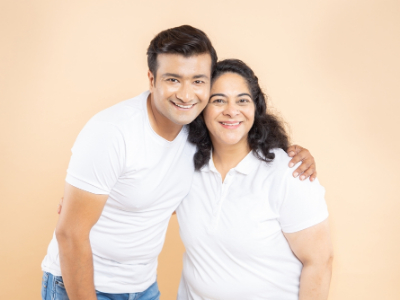Reena Sharma’s Story: I’m glad I know my genes.
- 02-08-2023
- 18:56

Reena, 45 years old lady from somewhere in Gujarat, married having happy family was diagnosed with triple-negative breast cancer, knew her genetics had probably played a role in her diagnosis. Reena is a vice president in one of the top banks of India and her mother when she was 22 years was diagnosed with cancer mother. Thought her mother is a cancer survivor but she faced lot of problems.
As a collegian she says she has seen her mother having painful life after cancer. Reena’s oncologist referred her to a genetic counsellor after reviewing her family history. The genetic counsellor diagnosed Reena with a BRCA gene mutation that increased her lifetime risk of breast cancer by 72%.
“For me, knowledge is power,” Reena says. “I was excited to know they’d found a reason for my cancer.
At the beginning, I was really scared, but at the same time this would tell me what to do now onwards.”
Having two teenage daughters makes her to worry about them and their future.
“She recollects how she used help her mother and studying as well. Her father strongly recommends to go for genetic testing as he never wanted to see her daughter and granddaughters suffering.
Reena’s doctor advised her to get a double mastectomy to treat the breast cancer and reduce her risk of recurrence. Hearing this she recollected the images of her mother having so many scars and pain.
“After my surgery, it took a long time for me to process how I looked,” Reena says. “My mobility and flexibility, being able to lift my arms again, cook for my daughters, doing exercise and so on. I wanted to regain that.”
Reena began to recover slowly and gradually. Her physical and emotional wellbeing improved. “I feel I came to know my genes and let me help others to know their future and take action as per that as I can feel their pain and emotional trauma.”
“My genetic counsellor helped me a lot by letting me know regarding lifestyle I need to change” Reena says.
Mrs. Priya Banerjee’s Story – I modified my both son’s life to save their lives
- 02-08-2023
- 18:57

Mrs. Priya Banerjee, a 52-year-old woman from somewhere in Guwahati having heart disease; symptomatic for 4 years with episodes of palpitation that occasionally led to chest tightness, anxiety, fatigue, and also recent exertional syncope. During initial workup, TTE (transthoracic echocardiogram) revealed left-side heart failure (ejection fraction 25%), and ECG holter monitoring showed sinus rhythm and occasional VPB (ventricular premature beats) bigeminy. To further characterize the disease and find the etiology, no valvular disease was detected and cardiac MRI (magnetic resonance imaging) CMR (cardiovascular magnetic resonance imaging) suggested IDCM (Idiopathic Dilated CardioMyopathy), LLC (Lake Louise Criteria); the thallium myocardium perfusion scan was also unremarkable except for mild ischemia in a midventricular segment of anterior wall.
The patient received an implantable cardioverter-defibrillator (ICD) implantation as secondary prevention for life-threatening arrhythmia (after a VT attack). Her family history included her father had a heart transplantation surgery; his heart condition had a similar clinical picture. To date, the off-spring’s clinical screening for evidence of DCM (dilated cardiomyopathy) has been negative despite detecting some genetic variants related to DCM.
The family’s pedigree recommended an autosomal dominant pattern of inheritance for DCM with 50% recurrence risk. After several comprehensive counselling sessions, all possible genetic investigations were thoroughly discussed.
Her physician suggested to undergo cardiac genetic testing for her two sons in this case along with her.
Various variations in different genes coding crucial proteins in cardiac muscle structure like Titin, Obscurin, MYH6, LAMA4, and proteins involved in channels such as CAVNA1C, SCN1B, and SCN5A, were detected.
The genetic tests revealed her elder son had 45% risk of DCM whereas another one has 15% risk. The Cardiologist framed their management plan looking at their genetic tests and improve their lifestyle and delay the chances of complications.
Both the boys maintained the same lifestyle as suggested by doctor.